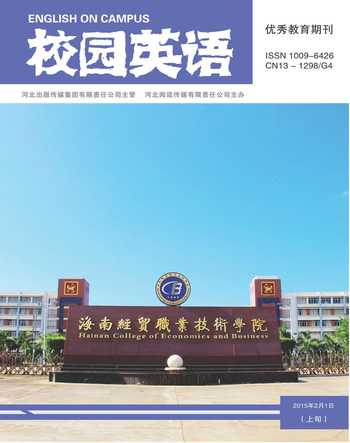Remarks on the physical factor influencing the individual language learners
刘晨君
【Abstract】individual language learner as a subject of learning can be influenced by many factors such as physical factor,cognitive factor,and affective factor.All of which play an important role in language learning.These three factors are worthy of our research and physical factor will be discussed in this essay.
【Key words】age; acquisition; physical
It is a common phenomenon that if a class studies a foreign language for some times,they would get different level.Why there exists so much difference? Many linguists have done a lot of research about it,and most of them agree that it is because of the difference between individual language learners.Different learners get different language acquisitions.This paper will discuss the factors influencing individual language learners.The writer will explain it in terms of the physical factor.
From the experience,we know that the age is an important physical factor in the process of the first language acquisition.In terms of the first language learning,it would be difficult for them to acquire a language even they were in an ideal language environment.Most of us know the story about a wolf-man.When wolf-man came back from the forest,he still could not speak human language.That was because he was divorced from the normal living environment of human beings until missed his best period for learning a language,which we called‘critical period hypothesis.The notion of a critical period was first proposed by Lenneberg and was only connected to the first language acquisition.Then,some linguists have found the hypothesis could be applied to the second language learning,and the critical period means that there is a period when language acquisition can be got naturally and easily.Beyond the time,language becomes increasingly difficult to learn.The hypothesis says that the suitable age for language acquisition is the first ten years of life.During this period the brain has a good plasticity,but with the age growing,the plasticity begins to disappear.It is then difficult for learners to get a native-like intonation and pronunciation of a second language,which might explain why those who begin to learn the second language during the critical period do better than those who begin to learn when they are adults.
However,the critical period hypothesis by itself is an inadequate account of the role played by the age in the second language learning is another important thing between children and adults.In most studies,experiments of the speed of learning the second language have been made by learners of different ages.Research shows that differences between younger and the older learners depend on what aspect of language is being examined,by most studies between the people at different levels.It is found that with regard to morphology and syntax the adolescents did best followed by the adults with the children last.There is a little difference in pronunciation.The grammar differences also can be diminished with the childrens catching up.There is a lot of evidence to show that individuals generally cant get a native-like accent in a second language unless they begin to learn it at an early age.So does grammar.Patowaski studied 67 educated immigrants to the United States and found that learners who entered the United States before the age of 15 got a more syntactically proficient than learners who had entered after 15.
After investigating child-adult differences in the second language learning,krashen summarized three generalization of the relationship between age ,rate and the second language learning:(1) adults proceed through early stages of syntactic and morphological development faster than children (2) older children acquire faster than younger children (3) acquirers who begin natural exposure to a second language during childhood generally achieve higher second language proficiency than those beginning as adults.In other words,adults and older child acquire the second language faster than young children.But in the long-run,childrens acquisition will be superior.Therefore,age is an important factor in the second language acquisition.The language learner at different ages should take different ways to make themselves to be good learners.
Reference:
[1]Marion Williams,Robert L.Burden.Psychology for Language Teachers[M].Foreign Language Teaching and Research Press,Peoples Education Press.Cambridge Press,2000.
[2]Rod Ellis.Understanding Second Language Acquisition[M].Shanghai Foreign Language Education Press,1999.

